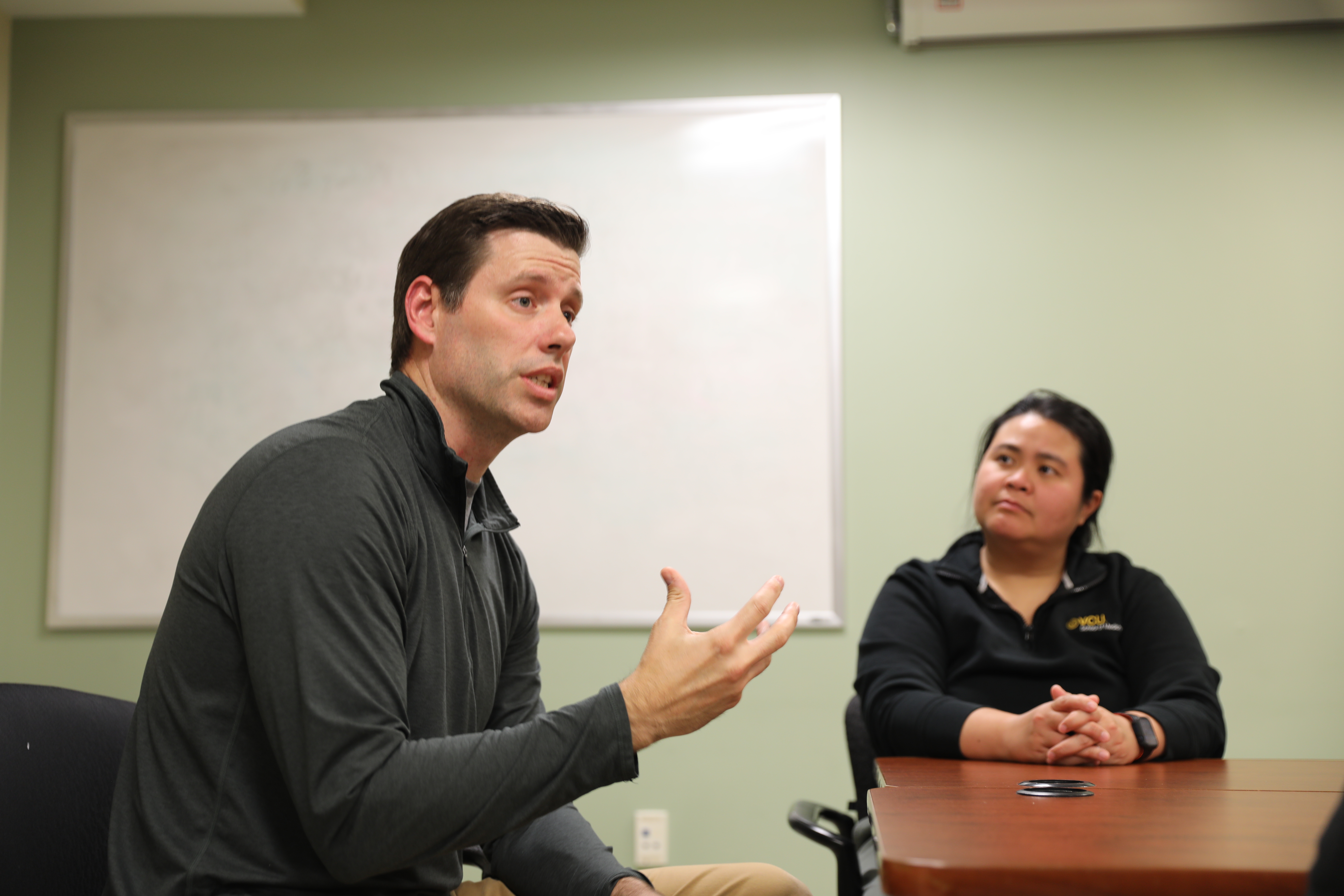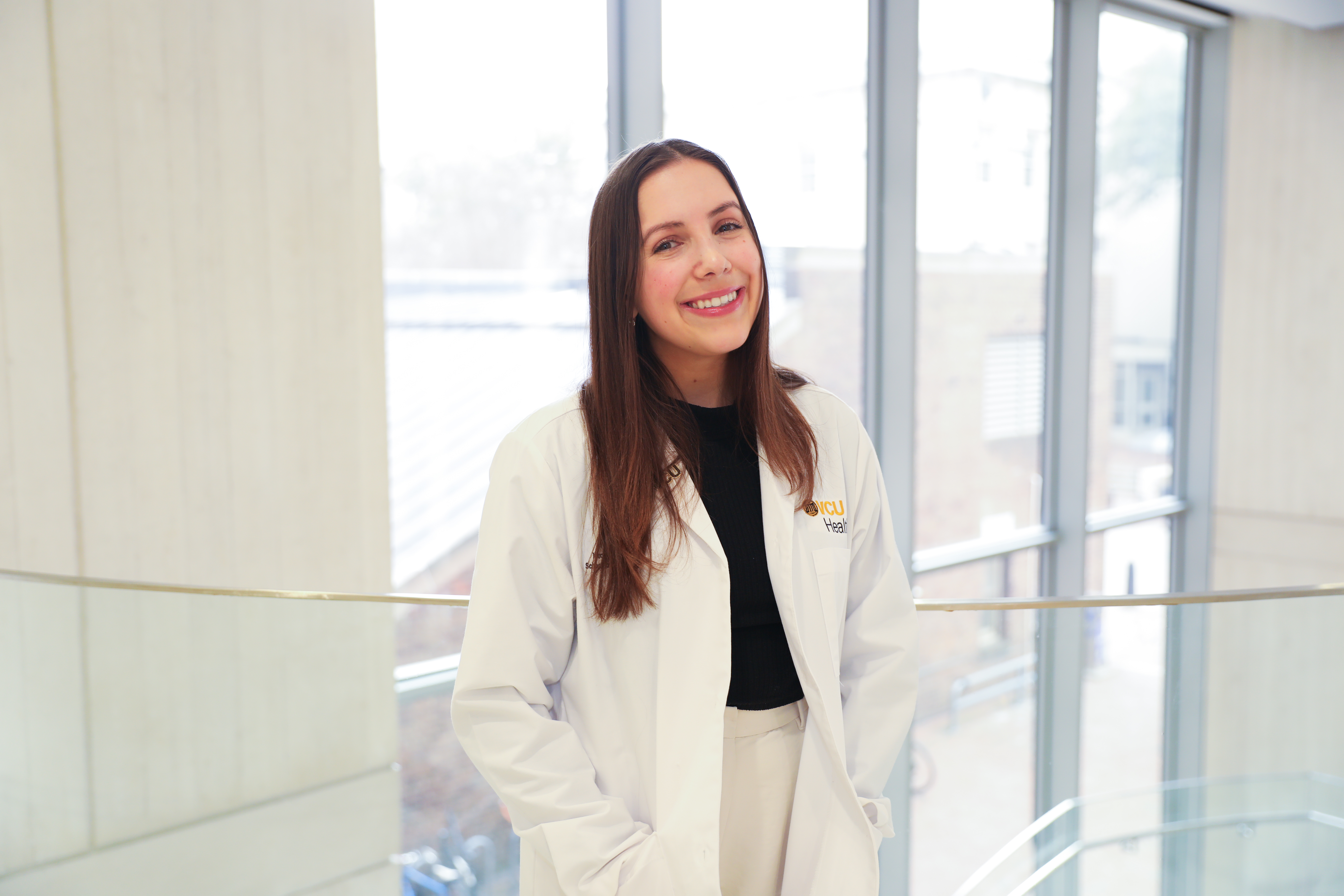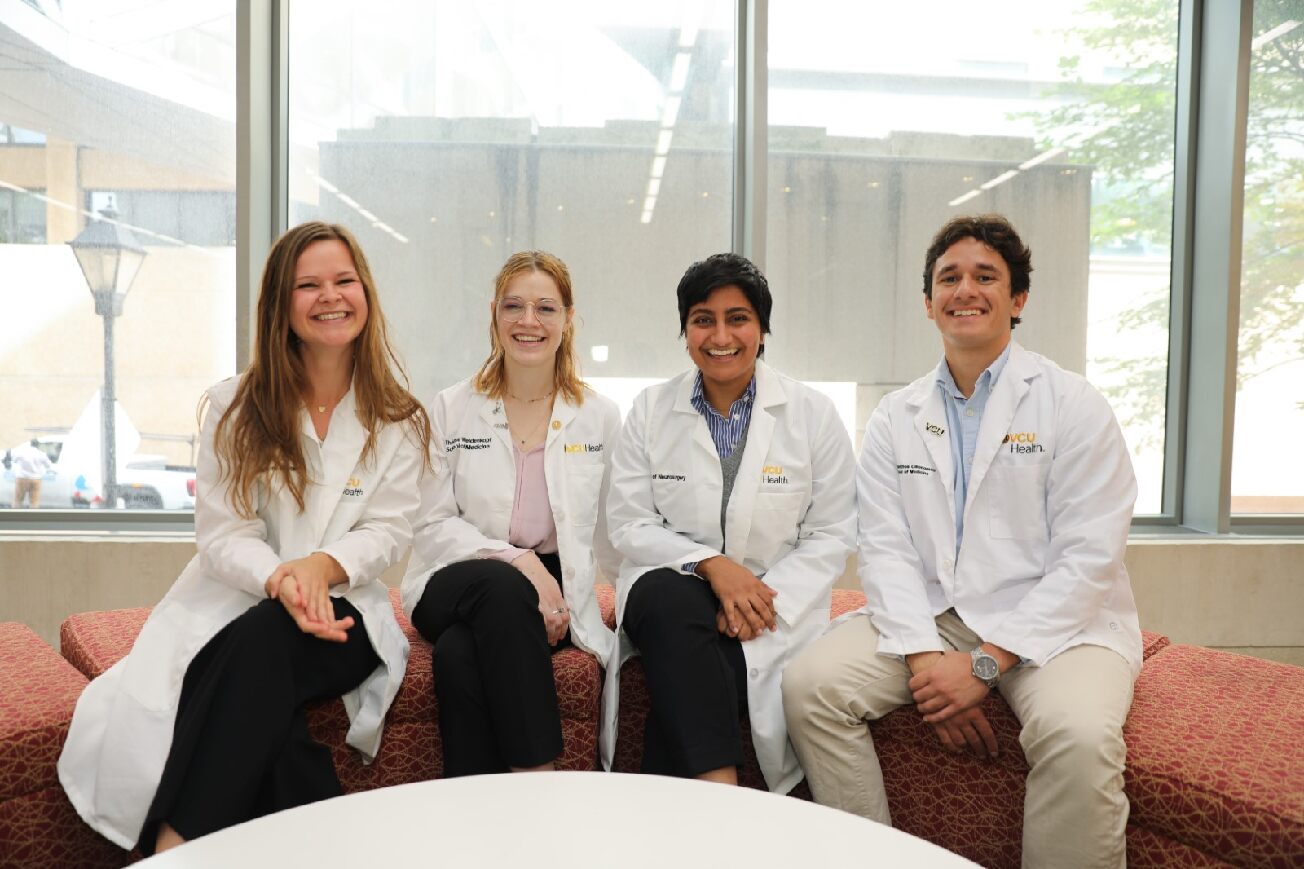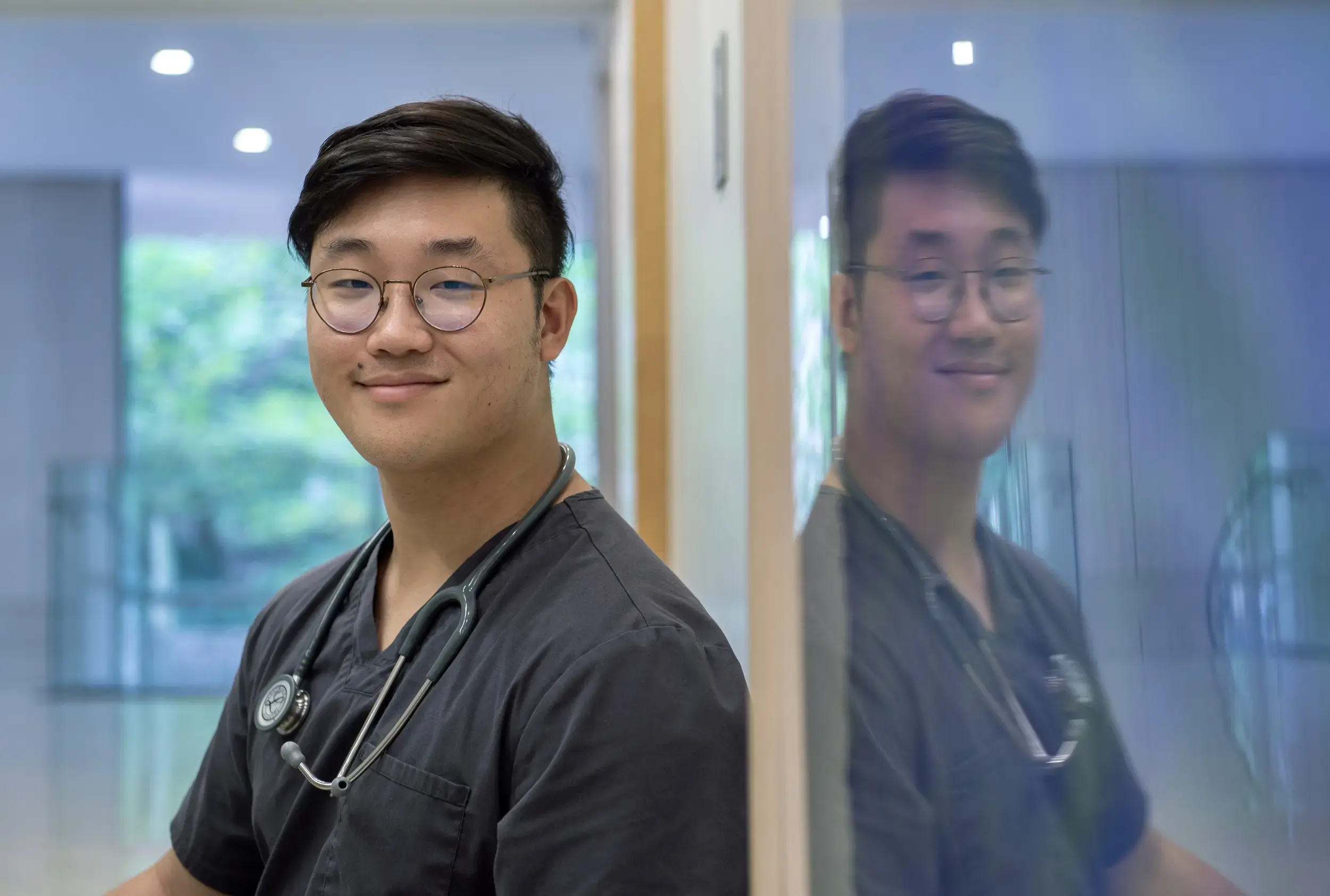Building connections: New director of medical student research will enhance learning opportunities for future doctors
With a focus on fostering mentorship and hands-on experience, Stephen Miller, D.O., aims to bridge the gap between medical students and impactful research on campus.

Stephen Miller, D.O., (left), the inaugural director of medical student research, speaks with student leaders about finding research opportunities. (Photo by Arda Athman, VCU School of Medicine)
Stephen Miller, D.O., has been at VCU School of Medicine since starting his emergency medicine residency in 2011. During that time, he has worked closely with medical students and trainees through roles like assistant residency program director, Project HEART group leader and mentor for preclinical students interested in emergency medicine. With those leadership experiences, successful research projects and an M.S. in biostatistics underway, he was thrilled to accept the School of Medicine’s new position of director of medical student research.
“VCU is an amazing place that has always done, and continues to do, outstanding research and really cutting-edge things,” Miller said. “Medical students have always been a big part of that, but finding and navigating opportunities has always been a bit of a challenge.”
The inaugural role is one of several Office of Medical Education initiatives to enhance opportunities and support for medical student research. According to Luan Lawson, M.D., senior associate dean of medical education and student affairs, the new structure will create a guided, supportive environment where students can explore their interests, build essential skills and receive personalized mentorship. Students will also have access to workshops on topics like study design and navigating the research process.
“What excites me most is the opportunity to build a research culture where students feel empowered to ask meaningful questions, pursue answers and contribute to the future of health care,” Lawson said. “With Dr. Miller in this dedicated role, we have someone focused not only on inspiring students, but also on streamlining processes to make research more accessible and less daunting.”
Meeting students where they are
While research is not a mandatory, graded component of the M.D. curriculum, it can be a significant part of a medical student’s journey. More students are turning to research as a way to explore specialties and, with the USMLE Step 1 exam now pass/fail, as a means for differentiating their medical school performance to make their residency applications more competitive.
As students start to narrow in on a career path, Miller said, it’s important for them to understand the role research plays in that particular field. For example, some specialties and residency programs will want to see more research on a student’s application than others. Other specialties, he said, may lend themselves to different types of scholarship, like patient safety or other qualitative projects.
Parsing through it all, while also staying on top of classes, studying for exams and choosing a specialty, can be overwhelming, Miller said. Students are encouraged to explore a searchable list of faculty mentors on the School of Medicine’s website, which serves as a primary resource for students seeking projects to join. Miller is eager to help make more direct connections and help students find the right fit for their interests and careers.
“My hope is that having somebody who’s an advocate for students will be a win for everybody,” Miller said, noting that faculty also benefit from including students in their research efforts. “It can be a very daunting process, especially because their curriculum is so jam packed and they’re so busy, so I want to be able to offer that extra lifeline for them.”
Jake Mikesell, president of the Class of 2026, recently joined other student leaders in a session with Miller to discuss the new role. Mikesell, who plans to pursue emergency medicine, has several research projects under his belt, including a study with Miller on chronic pain and the use of opiates in the emergency department. He said he’s eager to see how the changes will help address anxieties his peers may have in finding the right research opportunities.
“I’m very excited about the direction that research is going in, and looking forward to seeing what Dr. Miller can do for students,” Mikesell said.
In the coming weeks, Miller will continue meeting with students for them to ask questions, share their research experiences and identify their needs. The next focus group session will be Friday, April 11 at 4 p.m. in MMEC 3-101, with more dates to come. He will also be available for one-on-one chats during his open office hours on Tuesdays, noon – 2 p.m., on the second floor of the main hospital in office 608.
Students should keep an eye on their emails, the School of Medicine’s Instagram and the Research for Medical Students section of the school’s website for upcoming research-related focus groups, events and workshops.
Contact Stephen Miller, D.O., director of medical student research
Email
stephen.miller@vcuhealth.org
Office hours
Tuesdays, noon – 2 p.m.
Main hospital, second floor, office 608
Send us your stories!
The School of Medicine communications team is always looking to highlight student success, faculty achievement, cutting-edge research and innovative initiatives around the MCV Campus. If you have an idea for a story, please submit your pitch to laura.ingles@vcuhealth.org.
Stephen Miller, D.O., has been at VCU School of Medicine since starting his emergency medicine residency in 2011. During that time, he has worked closely with medical students and trainees through roles like assistant residency program director, Project HEART group leader and mentor for preclinical students interested in emergency medicine. With those leadership experiences, successful research projects and an M.S. in biostatistics underway, he was thrilled to accept the School of Medicine’s new position of director of medical student research.
“VCU is an amazing place that has always done, and continues to do, outstanding research and really cutting-edge things,” Miller said. “Medical students have always been a big part of that, but finding and navigating opportunities has always been a bit of a challenge.”
The inaugural role is one of several Office of Medical Education initiatives to enhance opportunities and support for medical student research. According to Luan Lawson, M.D., senior associate dean of medical education and student affairs, the new structure will create a guided, supportive environment where students can explore their interests, build essential skills and receive personalized mentorship. Students will also have access to workshops on topics like study design and navigating the research process.
“What excites me most is the opportunity to build a research culture where students feel empowered to ask meaningful questions, pursue answers and contribute to the future of health care,” Lawson said. “With Dr. Miller in this dedicated role, we have someone focused not only on inspiring students, but also on streamlining processes to make research more accessible and less daunting.”
Meeting students where they are
While research is not a mandatory, graded component of the M.D. curriculum, it can be a significant part of a medical student’s journey. More students are turning to research as a way to explore specialties and, with the USMLE Step 1 exam now pass/fail, as a means for differentiating their medical school performance to make their residency applications more competitive.
As students start to narrow in on a career path, Miller said, it’s important for them to understand the role research plays in that particular field. For example, some specialties and residency programs will want to see more research on a student’s application than others. Other specialties, he said, may lend themselves to different types of scholarship, like patient safety or other qualitative projects.
Parsing through it all, while also staying on top of classes, studying for exams and choosing a specialty, can be overwhelming, Miller said. Students are encouraged to explore a searchable list of faculty mentors on the School of Medicine’s website, which serves as a primary resource for students seeking projects to join. Miller is eager to help make more direct connections and help students find the right fit for their interests and careers.
“My hope is that having somebody who’s an advocate for students will be a win for everybody,” Miller said, noting that faculty also benefit from including students in their research efforts. “It can be a very daunting process, especially because their curriculum is so jam packed and they’re so busy, so I want to be able to offer that extra lifeline for them.”
Jake Mikesell, president of the Class of 2026, recently joined other student leaders in a session with Miller to discuss the new role. Mikesell, who plans to pursue emergency medicine, has several research projects under his belt, including a study with Miller on chronic pain and the use of opiates in the emergency department. He said he’s eager to see how the changes will help address anxieties his peers may have in finding the right research opportunities.
“I’m very excited about the direction that research is going in, and looking forward to seeing what Dr. Miller can do for students,” Mikesell said.
In the coming weeks, Miller will continue meeting with students for them to ask questions, share their research experiences and identify their needs. The next focus group session will be Friday, April 11 at 4 p.m. in MMEC 3-101, with more dates to come. He will also be available for one-on-one chats during his open office hours on Tuesdays, noon – 2 p.m., on the second floor of the main hospital in office 608.
Students should keep an eye on their emails, the School of Medicine’s Instagram and the Research for Medical Students section of the school’s website for upcoming research-related focus groups, events and workshops.
Contact Stephen Miller, D.O., director of medical student research
Email
stephen.miller@vcuhealth.org
Office hours
Tuesdays, noon – 2 p.m.
Main hospital, second floor, office 608
Send us your stories!
The School of Medicine communications team is always looking to highlight student success, faculty achievement, cutting-edge research and innovative initiatives around the MCV Campus. If you have an idea for a story, please submit your pitch to laura.ingles@vcuhealth.org.
Looking for research opportunities?
Check out the Research for Medical Students section on the School of Medicine’s website for funded research programs, contacts for each department and a searchable list of faculty researchers who are currently accepting medical students as mentees.
Tags:


